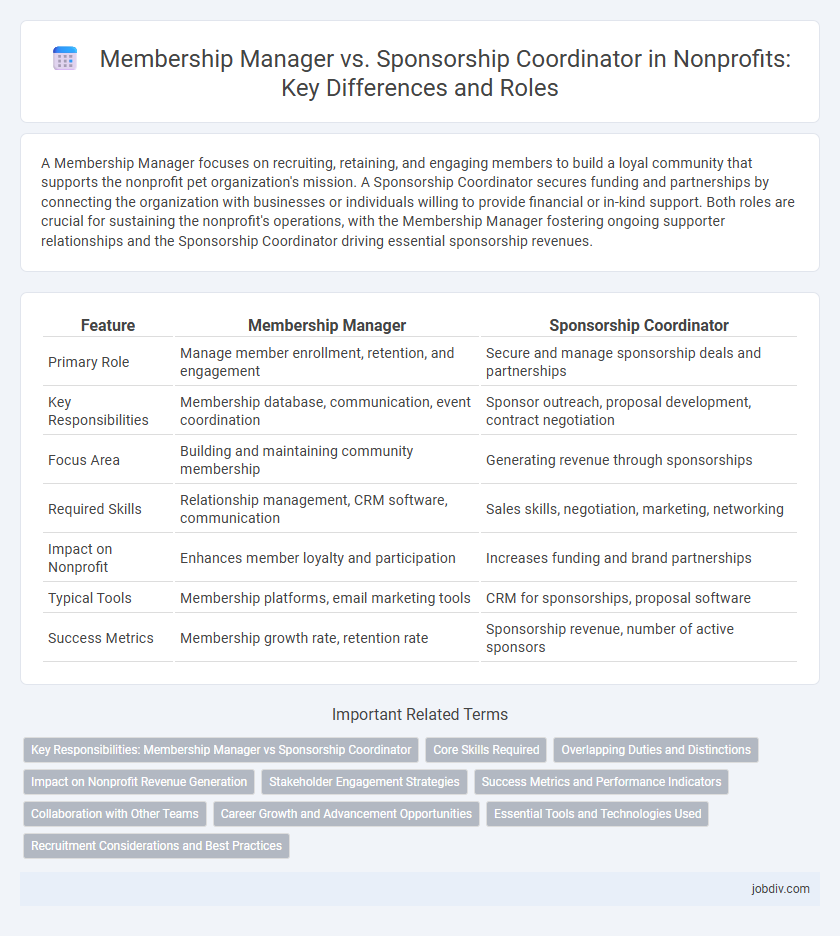A Membership Manager focuses on recruiting, retaining, and engaging members to build a loyal community that supports the nonprofit pet organization's mission. A Sponsorship Coordinator secures funding and partnerships by connecting the organization with businesses or individuals willing to provide financial or in-kind support. Both roles are crucial for sustaining the nonprofit's operations, with the Membership Manager fostering ongoing supporter relationships and the Sponsorship Coordinator driving essential sponsorship revenues.
Table of Comparison
| Feature | Membership Manager | Sponsorship Coordinator |
|---|---|---|
| Primary Role | Manage member enrollment, retention, and engagement | Secure and manage sponsorship deals and partnerships |
| Key Responsibilities | Membership database, communication, event coordination | Sponsor outreach, proposal development, contract negotiation |
| Focus Area | Building and maintaining community membership | Generating revenue through sponsorships |
| Required Skills | Relationship management, CRM software, communication | Sales skills, negotiation, marketing, networking |
| Impact on Nonprofit | Enhances member loyalty and participation | Increases funding and brand partnerships |
| Typical Tools | Membership platforms, email marketing tools | CRM for sponsorships, proposal software |
| Success Metrics | Membership growth rate, retention rate | Sponsorship revenue, number of active sponsors |
Key Responsibilities: Membership Manager vs Sponsorship Coordinator
The Membership Manager oversees member recruitment, retention, and engagement strategies to grow and sustain the nonprofit's community base, ensuring consistent communication and benefits delivery. The Sponsorship Coordinator develops and manages relationships with corporate sponsors, coordinates sponsorship proposals, and aligns sponsorship activities with fundraising goals to maximize financial support. Both roles require strong organizational skills but focus on distinct stakeholder groups: members versus sponsors.
Core Skills Required
Membership Managers excel in relationship building, database management, and member engagement strategies, ensuring sustained donor loyalty and community growth for nonprofits. Sponsorship Coordinators specialize in negotiation, corporate partnership development, and event promotion skills to secure and manage sponsorship deals effectively. Both roles require strong communication, project management, and fundraising knowledge to support organizational missions.
Overlapping Duties and Distinctions
Membership Managers and Sponsorship Coordinators both engage in relationship building and communication to support nonprofit goals, with Membership Managers primarily focusing on recruiting, retaining, and engaging members while Sponsorship Coordinators concentrate on securing and managing corporate or individual sponsors. Overlapping duties include event planning and collaboration with marketing teams to promote organizational initiatives, yet Membership Managers emphasize member benefits and community growth, whereas Sponsorship Coordinators prioritize sponsor recognition and contractual obligations. Distinctions arise in performance metrics; Membership Managers track membership growth and retention rates, while Sponsorship Coordinators measure sponsorship revenue and fulfillment of sponsorship deliverables.
Impact on Nonprofit Revenue Generation
Membership Managers drive nonprofit revenue by cultivating sustained donor engagement and recurring membership fees, which ensures steady cash flow and community support. Sponsorship Coordinators enhance revenue through strategic partnerships and event-based sponsorships, securing larger, often one-time funding injections that amplify nonprofit visibility. Both roles are crucial but differ in their revenue generation methods, with Membership Managers focusing on consistent income streams and Sponsorship Coordinators targeting substantial, targeted financial boosts.
Stakeholder Engagement Strategies
Membership Managers drive stakeholder engagement by fostering long-term relationships with donors and members through personalized communication, events, and retention programs, enhancing loyalty and commitment. Sponsorship Coordinators focus on creating value propositions and managing corporate partnerships, aligning sponsor goals with nonprofit missions to secure funding and increase brand visibility. Both roles utilize targeted engagement strategies but differ in audience focus--Members for sustained support and Sponsors for financial and in-kind contributions.
Success Metrics and Performance Indicators
Membership Managers drive growth by focusing on metrics such as member retention rates, renewal percentages, and overall membership growth, directly impacting recurring revenue streams. Sponsorship Coordinators measure success through sponsorship acquisition rates, total sponsorship revenue, and sponsor satisfaction scores, which influence the nonprofit's event funding and partnership sustainability. Both roles utilize performance indicators like engagement levels and conversion rates to optimize their strategies and contribute to the organization's financial health.
Collaboration with Other Teams
Membership Managers work closely with fundraising and communications teams to develop engagement strategies that drive member growth and retention. Sponsorship Coordinators collaborate with marketing and event planning teams to secure and manage corporate partnerships that support nonprofit initiatives. Both roles require cross-departmental communication to align goals, optimize resources, and maximize organizational impact.
Career Growth and Advancement Opportunities
Membership Managers in nonprofit organizations typically oversee member engagement strategies and data management, positioning them for growth into development director or community outreach roles. Sponsorship Coordinators focus on securing and maintaining corporate partnerships, creating pathways to senior fundraising or partnership management careers. Both roles offer distinct advancement opportunities, with Membership Managers often advancing through member services and Sponsorship Coordinators through strategic relationship development.
Essential Tools and Technologies Used
Membership Managers rely heavily on CRM systems, such as Salesforce or Wild Apricot, to efficiently track member engagement, automate renewals, and manage communications. Sponsorship Coordinators utilize proposal software like PandaDoc and relationship management tools including HubSpot to create compelling sponsorship packages and maintain sponsor relationships. Both roles leverage analytics platforms to measure campaign success and optimize fundraising efforts effectively.
Recruitment Considerations and Best Practices
Membership Managers focus on recruiting and retaining members by implementing targeted outreach campaigns and personalized engagement strategies that foster community loyalty. Sponsorship Coordinators prioritize identifying and securing corporate sponsors through tailored proposals and relationship-building efforts that align sponsors' goals with the nonprofit's mission. Effective recruitment for both roles involves leveraging data analytics to identify prospects, clear communication of organizational value, and continuous follow-up to convert interest into committed partnerships.
Membership Manager vs Sponsorship Coordinator Infographic

 jobdiv.com
jobdiv.com